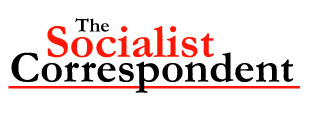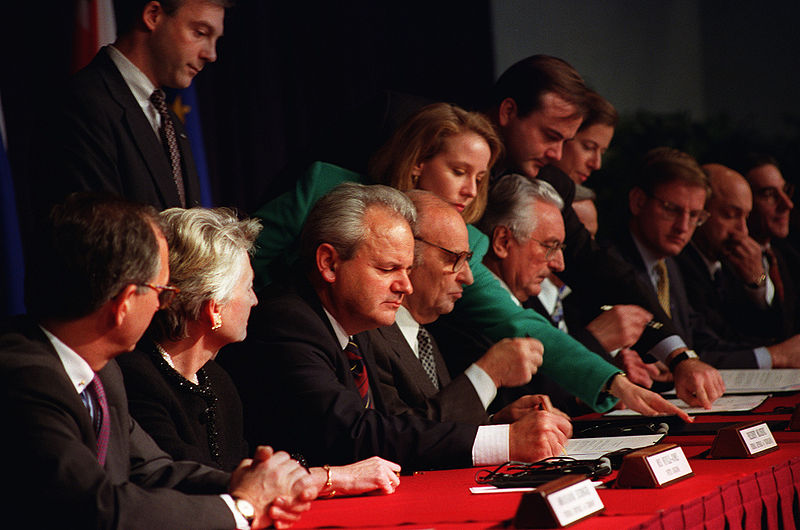Media silence when Milosevic is cleared
By Alex Davidson
The International Criminal Tribunal for the Former Yugoslavia (ICTY) in The Hague failed to hold a press conference or announce that on March 24, 2016 it deemed that the late Yugoslav and Serbian President Slobodan Milosevic was not responsible for the major war crimes he was charged with during the 1992-95 Bosnian war.
Instead, the tribunal conveniently buried it in the middle of its verdict against Radovan Karadzic. It can be found in the middle of the 2590 page verdict.
It was only because of the research of journalist Andy Wilcoxson, who uncovered the ICTY’s ruling in late July, that the exoneration came to light—but it has yet to make international headlines. [i]
Radovan Karadzic, the former Bosnian-Serb president was convicted of war crimes and sentenced to 40 years in prison at the same time as the tribunal found unanimously that it “is not satisfied that there was sufficient evidence presented in this case to find that Slobodan Milosevic agreed with the common plan of the "ethnic cleansing" of Muslims and Croats from Serbian territory.
In fact, the tribunal found the exact opposite to be true.
Much like the Western media hype around the “weapons of mass destruction” lies that led to the U.S. war against Iraq in 2003, Milosevic was called the “Butcher of the Balkans” in the “trial of the century” and was charged with “war crimes” in the midst of the NATO bombing of Yugoslavia in 1999.
Arrested in March 2001, Milosevic faced a five-year-long trial, defending himself, when he died in prison on March 11, 2006 under a very suspicious set of circumstances.
Milosevic’s death
He died of a heart attack just two weeks after the Tribunal denied his request to undergo heart surgery in Russia. He was found dead in his cell less than 72 hours after his attorney delivered a letter to the Russian Ministry of Foreign Affairs in which he said that he feared he was being poisoned.
The Tribunal’s official report on the inquiry into his death confirmed that, “Rifampicin had been found in a blood sample taken from Mr. Milosevic on 12 January 2006.” And that “Mr. Milosevic was not told of the results until 3 March 2006 because of the difficult legal position in which Dr. Falke (the Tribunal’s chief medical officer) found himself by virtue of the Dutch legal provisions concerning medical confidentiality.”
The presence of Rifamicin (a non-prescribed drug) in Milosevic’s blood would have counteracted the high blood pressure medication he was taking and increased his risk of the heart attack that ultimately did kill him.
As Paul Wilcoxson wrote, “The Tribunal’s admission that they knew about the Rifampicin for months, but didn’t tell Milosevic the results of his own blood test until just days before his death because of ‘Dutch legal provisions concerning medical confidentiality’ is an incredibly lame and disingenuous excuse.
There is no provision of Dutch law that prohibits a doctor from telling the patient the results of his own blood test — that would be idiotic. On the contrary, concealing such information from the patient could be seen as malpractice.
U.S. State Department cables leaked to Wikileaks confirm that The Tribunal did discuss Milosevic’s medical condition and his medical records with U.S. Embassy personnel in The Hague without his consent. They clearly didn’t care about medical confidentiality laws when they were blabbing about his medical records to the American embassy.”
Milosevic exonerated
The International Criminal Tribunal for the former Yugoslavia ruling stated that in meetings between Serb and Bosnian Serb officials “Slobodan Milosevic stated that ‘(a)ll members of other nations and ethnicities must be protected’ and that ‘(t)he national interest of the Serbs is not discrimination’.” It also stated that “Milosevic further declared that crime needed to be fought decisively.”
The trial chamber noted that “Milosevic tried to reason with the Bosnian Serbs saying that he understood their concerns, but that it was most important to end the war.”
The judgement also stated that “Slobodan Milosevic expressed his reservations about how a Bosnian Serb Assembly could exclude the Muslims who were ‘for Yugoslavia’.”
The ICTY went on to say that “from 1990 and into mid-1991, the political objective of the Accused (Karadzic) and the Bosnian Serb leadership was to preserve Yugoslavia and to prevent the separation or independence of Bosnia and Herzegovina, which would result in a separation of Bosnian Serbs from Serbia”
Slobodan Milosovic, leader of Yugoslavia, was demonized and compared to Hitler incessantly by the mainstream media as an excuse for NATO and the U.S. to sanction, tear apart and kill thousands in the former Yugoslavia.
“It was just like watching the evil strutting Adolf Hitler in action,” wrote the News of the World’s political editor, when Milosevic had the temerity to defend himself in court. “There were chilling flashes of the World War Two Nazi monster as the deposed Serb tyrant harangued the court.”
To make sure readers did get the Milosevic=Hitler point, the News of the World illustrated their diatribe with a picture of Hitler ‘The Butcher of Berlin’, with a picture of Milosevic ‘The Butcher of Belgrade’
The exoneration of Slobodan Milosevic comes 10 years after his death.
[i] Wilcoxson, Andy, The Exoneration of Milosevic: the ICTY’s Surprise Ruling, 1 August 2016, www.counterpunch.org
"(Milosevic) died of a heart attack just two weeks after the Tribunal denied his request to undergo heart surgery in Russia. He was found dead in his cell less than 72 hours after his attorney delivered a letter to the Russian Ministry of Foreign Affairs in which he said that he feared he was being poisoned."


1995, Dayton Ohio, USA: Slobodan Milosevic signs the Dayton Accords formally ending the Bosnian war.






